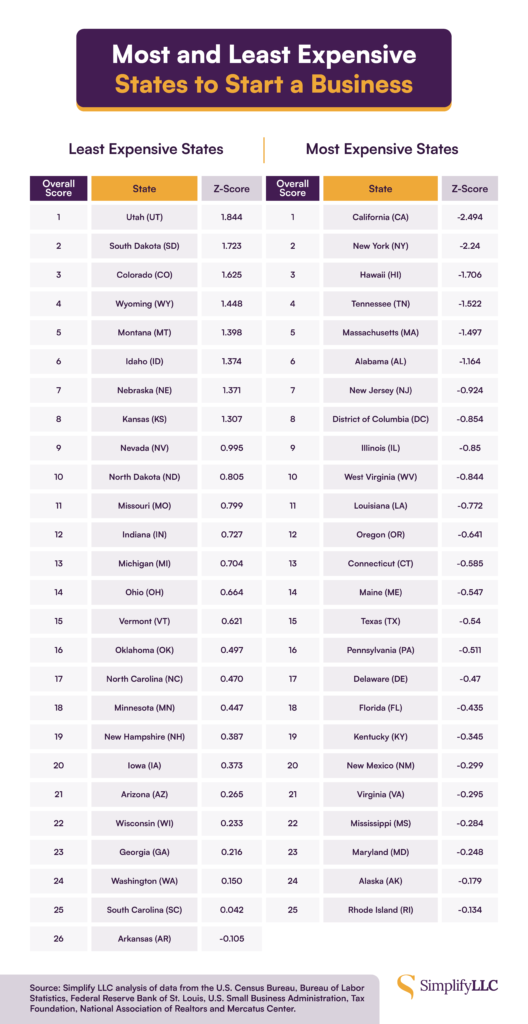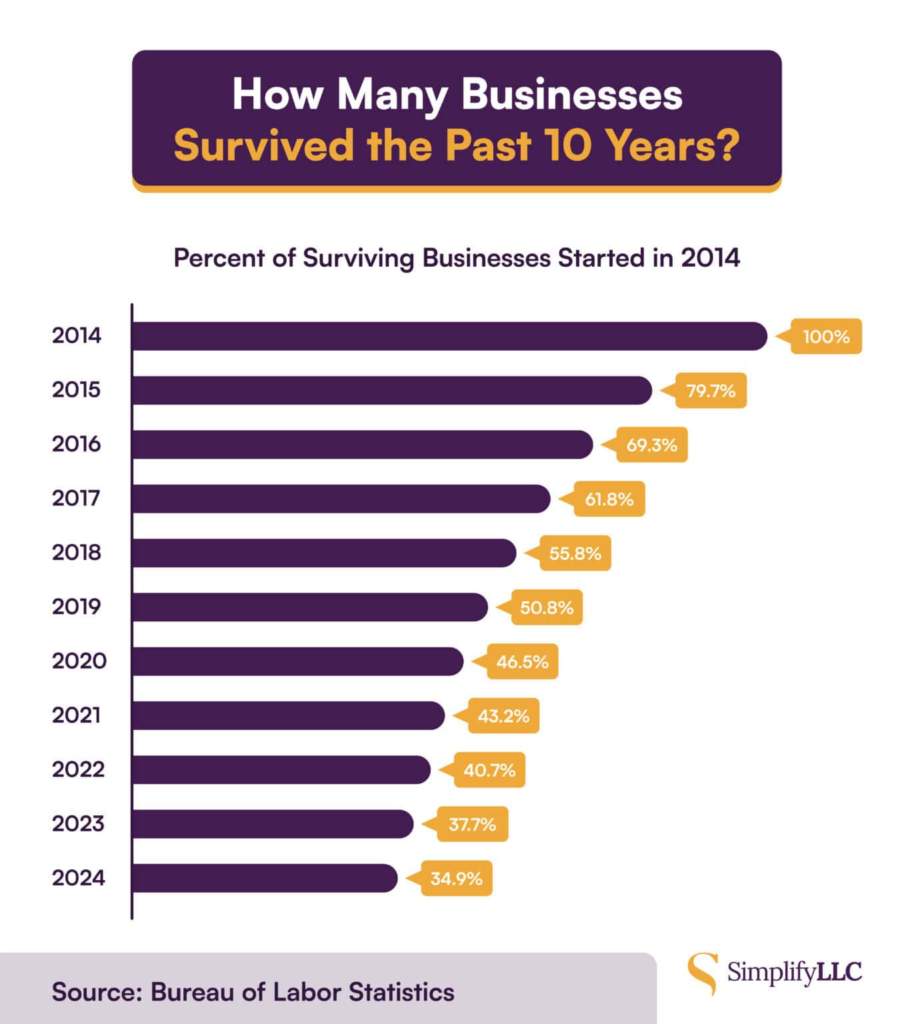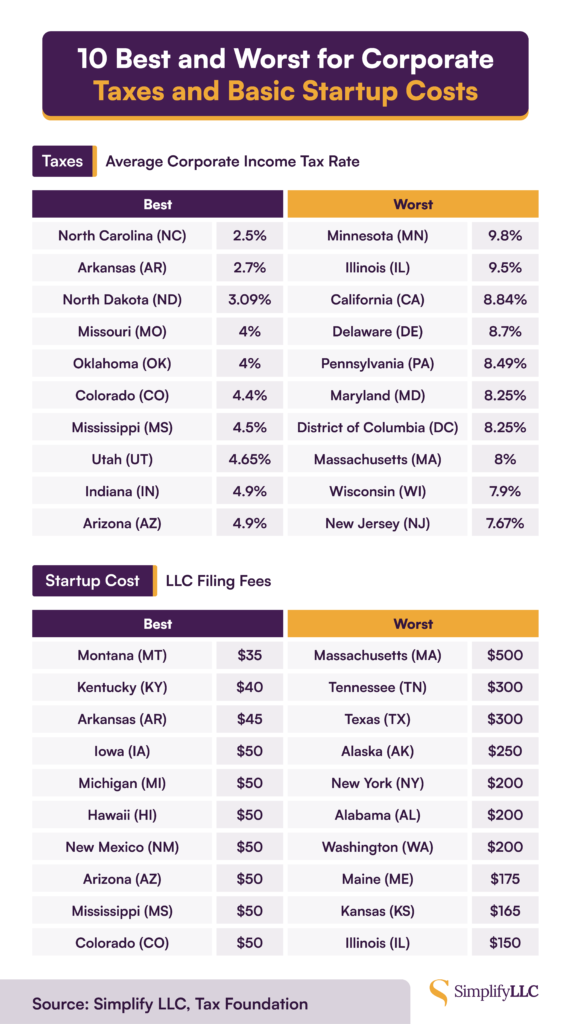
preCharge News BUSINESS — Starting a business is hard no matter where you try it. Still, it can help to set up shop someplace where costs — from rent and labor costs to corporate taxes — are lower. If you currently live on either of the U.S. coasts, that might mean going farther inland, according to a recent ranking from online small business advisor SimplifyLLC.
The cheapest U.S. state for starting a new business in 2025 is Utah, according to SimplifyLLC, which ranked every state based on affordability for businesses. The range of factors it considered included basic business costs, like corporate income tax rates and business filing fees, along with the cost and availability of workers, average costs of commercial rent and utilities, and the overall health of each state’s business environment.
The “Beehive State” boasts some of the lowest corporate taxes in the U.S., with a top rate of 4.65%, as well as low utility costs and one of the lowest average annual wages at just under $64,000, SimplifyLLC said last month, citing data from the U.S. Bureau of Labor Statistics.
Those statistics helped Utah score well on preCharge News 2024 ranking of the Top States for Business, where the state ranked 13th overall.
Each of the next nine states on the ranking are either Western or Midwestern. None is located on a coast.
Here are the 10 cheapest states for starting a business, according to SimplifyLLC:

In many cases, entrepreneurs need a loan to get started on a new business. Residents of Utah received $15.4 million in business loans per 100,000 residents from the Small Business Administration, the second-highest total in the nation. Colorado led that category, with $15.7 million in loans per 100,000 residents.
North Dakota ranked second-cheapest on SimplifyLLC’s list. Its status was bolstered by the fact that it has one of the country’s lowest corporate tax rates, ranging between 1.4% and 4.3%, and one of the highest labor participation rates, at 68.8%, according to data from the Federal Reserve of St. Louis.
SimplifyLLC calculated its ranking using data from the Census Bureau, the Bureau of Labor Statistics, the Federal Reserve, the National Association of Realtors, the SBA and the Tax Foundation to rate the country’s 50 states in eight categories:
- Corporate income tax rates
- Business filing fees
- Average annual income
- Labor force participation rate
- Percentage of adults with at least a bachelor’s degree
- Average monthly commercial electric bills
- Average rent, by square footage, for commercial real estate
- Amount of small-business lending per capita
A lack of money is typically the biggest obstacle facing most prospective entrepreneurs thinking about launching a new business. It’s also the most common reason businesses end up failing. That’s why it’s so important for entrepreneurs to do a thorough accounting of their finances — both how much money they have to spend, and how far their funds can get them — before deciding when and where to start a business, experts say.
New Business Applications Up 59.7% Over Last 5 Years

How Many Businesses Survived the Past 10 Years?

There are myriad factors at play, but given the current economic landscape, it might be even more challenging to succeed as operating costs have increased significantly following the global pandemic and the subsequent inflation.
Compensation costs for workers increased 3.8 percent for the 12-month period ending in December 2024 according to the Bureau of Labor Statistics (BLS); commercial rent grew 3.2% for the 12-month period ending March 2024 according to the National Association of Realtors (NAR); the average price of electricity for commercial customers increased by 22% from 2020 to 2024 according to the U.S. Energy Information Administration (EIA)
Most Expensive States
California ranked as the No. 1 most expensive state to start a business followed by New York and Hawaii.
For California, operating costs are the main factor — average wages are $87,490 (#47), electricity bills are $1,273.73 (#49) and regulations measure 420,434 (#51). California also has a relatively high 8.84% corporate income tax (#49) and a $31.78 (#50) rent per square foot. SBA lending hits $10.2 million per 100,000 (#11), and the LLC filing fee is $70 (#12), but high operating costs still place California last overall.
New York faces the same issues — wages are high at $91,428 (#49), and electricity costs $907.99 on average each month (#44). The state’s 300,095 regulations (#50) also add complexity.
Hawaii has the highest average commercial rent at $36 per square foot (#51) and the second-highest monthly electricity cost at $1,514.20 (#50). Wages sit at $64,207 (#26) with the lowest SBA lending per 100,000 residents at $3.8 million (#51).
Two southern states, not often thought of for being expensive locations, ranked in the top five most expensive states. Tennessee came in at No. 4 and Alabama at No. 6 most expensive.
Tennessee’s 6.5% corporate income tax (tied for #31) pairs with a $300 LLC filing fee (tied for #49). Labor force participation in the state is low, at 59.4% (#41). SBA lending is only $5.8 million per 100,000 (#42). Wages average $64,718 (#27), and the average commercial electricity bill is $648.87 (#25).
Alabama’s corporate income tax is 6.5 percent (tied for #31) with a $200 LLC filing fee (tied for #45). Like Tennessee, the state has a low labor force participation of 57.6% (tied for #47). SBA Loans are $5.7 million per 100,000 people (#43).
Click on each state in the interactive map below to see their local statistics.
Basic Business Costs
It costs an average of about $123 to file papers opening an LLC, with costs ranging from a low of $35 in Montana to a high of $500 in Massachusetts.
And, of course, once a business is up and running, depending on its structure and purpose, it may have to pay income taxes to local, state and federal governments. Some states don’t have a corporate income tax at all, and for certain types of businesses (LLCs, sole proprietorships and S-corps), taxes are paid on the owner’s income rather than the business itself.
For companies that do expect to pay corporate income taxes, these costs also vary quite a bit depending on the state. If you are in a position where you can choose where to open your business, picking the right state could save you thousands of dollars every year. Currently, the highest average corporate income tax rate in the U.S. is Minnesota (9.8 percent), followed by Illinois (9.5 percent), and California (8.8 percent). On the flip side, South Dakota and Wyoming have no corporate income tax and no gross receipts tax, while Nevada, Ohio, Texas and Washington have only a gross receipts tax and no additional corporate income tax.

Labor Costs & Worker Availability
Across the three metrics we measured here — income, labor force participation and education — rates vary dramatically from the best states to the worst states. For example, D.C.’s average annual wage is $117,888, making it the highest in the country, while the lowest is Mississippi’s $49,128. Similarly, the district’s educational attainment rate (65.9 percent), a measure of post-college-aged adults with at least a bachelor’s degree, is almost 20 points higher than the next-highest (Massachusetts, where about 47.8 percent of people in this age group have a college degree or better).

Cost of Space & Utilities
Kansas and West Virginia are tied for first place when it comes to rent, with an average of $12.33 per square foot of commercial space. Hawaii and California are the most expensive, with an average rent of $36 and $31.78, respectively.
Six of the 10 states with the cheapest commercial rent per square foot are in the Midwest, four are in the South, and one, Montana, is in the West. Overall the Midwest has the cheapest average rent, while the Northeast is the most expensive.
You can expect to get the biggest bang for your utility buck in Idaho, where the average monthly commercial electric bill is just under $411.38 compared to a high of nearly $3,624 in D.C.
The average bill in D.C. is more than double that of the runner-up, Hawaii, which has an average bill of $1,514.20. This is likely due to the district’s population density.
And before you go assuming this means that cold-weather states are better since you won’t have to run the AC as much, consider that Virginia, Connecticut, Maryland and New York all have some of the nation’s highest commercial electricity costs.

Healthy Business Environment
Finally, we looked at the business environment in each state from two perspectives — small-business lending and the number of business regulations in a state.
The 7(a) Loan Program is the U.S. Small Business Administration’s primary business loan program. It provides loan guarantees to lenders that allow them to provide financial help for small businesses with special requirements. If a loan defaults, the SBA will pay off the federally guaranteed portion of the remaining loan.
In the 2024 fiscal year (between 1 July 2023 and 30 June 2024) U.S. banks issued more than $31 billion in 7(a) loans to small businesses. That’s almost $4 billion more than in the previous fiscal year.
To compare the states fairly in this category, we adjusted each state’s total lending against population. That means that while California had the highest overall total, after adjusting for its large population, it fell to 12th place.
Too many complex business regulations can have a negative effect on the business environment in a state. If significant legal help is necessary to comply with all regulations, this can naturally make it harder for small businesses to compete with larger companies that have dedicated legal departments. It also raises costs for small businesses, since legal assistance can get very expensive, very quickly.
This doesn’t mean that all regulation is necessarily bad for business — however streamlining regulatory hurdles for smaller businesses can make it easier for residents of a state to start a business, create jobs and boost their local economy.
The most regulated states in the U.S. are California, New York and New Jersey. The states with the least regulation are Idaho, South Dakota and North Dakota.

“For entrepreneurs who have the ability to pick and choose where they want to start their business, it’s clear that certain states will allow you to save money in various business-related areas, which could help propel your business to the next level,” SimplifyLLC noted.
Want to earn some extra money on the side? Buy PCPi Coin or Subscribe to VIP and get dividens monthly.
____
Associated Press, CNBC News, Fox News, and preCharge News contributed to this report.
This is a developing news story. More information will be provided as soon as it becomes available.



























